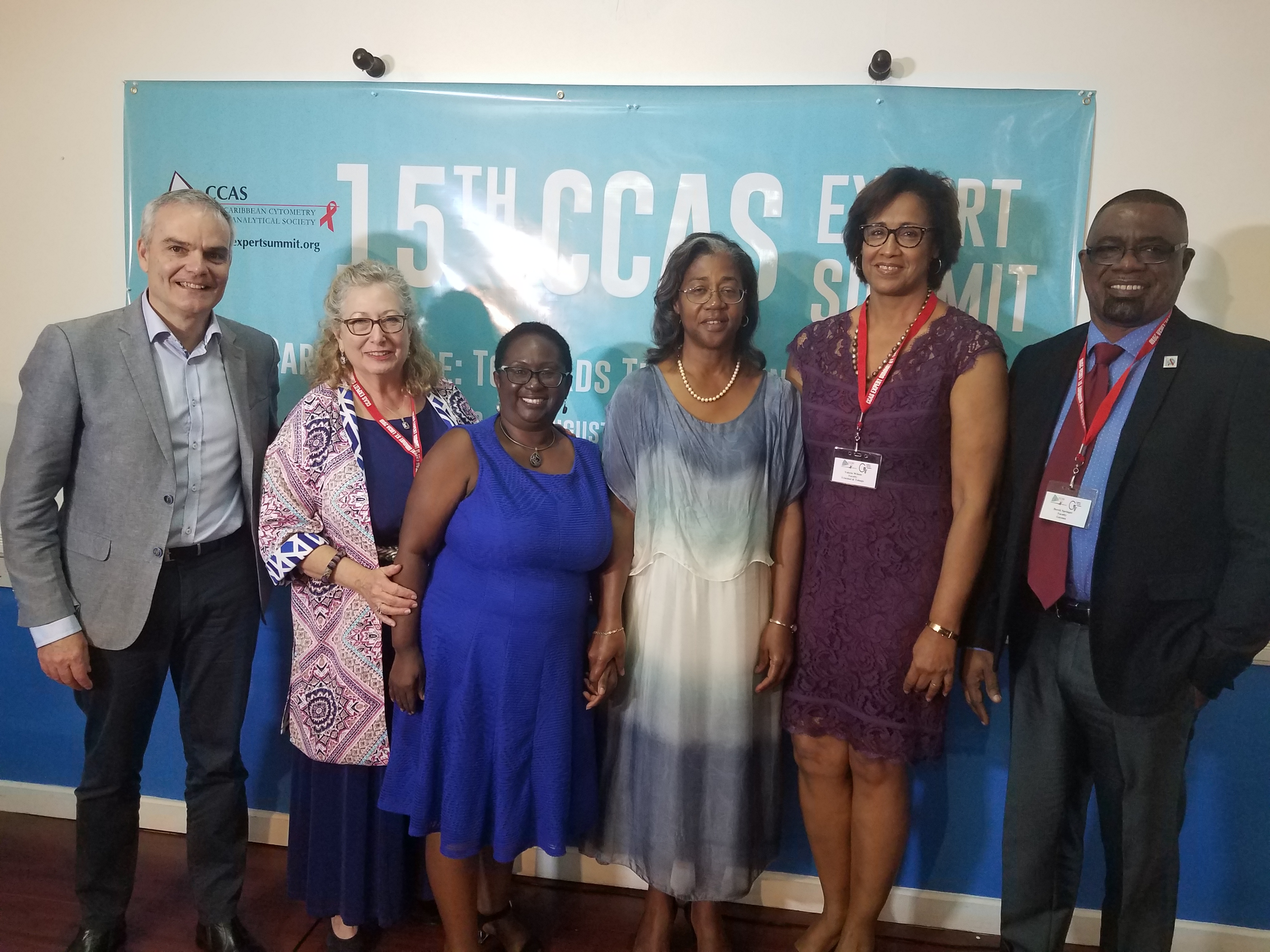
Successful Expert Summit, From Care to Cure – Towards the elimination of HIV, held in Saint LuciaPANCAP Director, Dereck Springer delivered a well-received presentation on Test, Treat, Defeat in Caribbean Advocacy and the Caribbean Regional Strategic Framework: beyond 2018.
Image: (L-R) CCAS Chairman Clive Landis, RTI International founder Dr. Wendee Wechsberg, CCAS President Vera Layne, Saint Lucia Health and Wellness Minister Mary Isaac, Caribbean Med Labs Foundation Director, Valerie Wilson, Director of PANCAP, Dereck Springer.
The 15th Annual Caribbean Cytometry & Analytical Society’s (CCAS) Expert Summit, “From Care to Cure – Towards the Elimination of HIV”, was held in Saint Lucia from 26 to 30 August. The summit brought together regional and international HIV experts to explore scientific innovations and social interventions that will accelerate progress toward ending the AIDS epidemic as a public health threat.
Present was Senator The Hon. Mary Isella Isaac, Minister for Health and Wellness, Saint Lucia. View an interview with the Senator here.
PANCAP Director, Dereck Springer delivered a well-received presentation on Test, Treat, Defeat in Caribbean Advocacy and the Caribbean Regional Strategic Framework: beyond 2018. He provided an illustration of the Barbados Treat All Programme, documented in a case study and animated video by PANCAP (View here). The Director advocated that the 2030 goal of ending AIDS can be realized with the region utilizing the Barbados Treat All experience as a best practice to improve the HIV response and to achieve better health outcomes for People Living with HIV and AIDS (PLHIV).
CCAS Chairperson, Professor Clive Landis pointed to successes of the Caribbean HIV response including the validation of seven countries for the elimination of Mother-to-child transmission of HIV and Syphilis.
He noted that while the region has embraced the power of antiretroviral treatment and viral suppression to prevent HIV infections in newborns, there is an inadequate understanding among the public about how successful treatment can also reduce sexual transmission.
View Professor Landis’ remarks here.
UNAIDS Director for Latin America and the Caribbean, Dr. César Núñez, noted that through the 2016 Political Declaration on ending AIDS, United Nations members states have agreed to adopt a Fast-Track strategy that involves increasing prevention, testing, and treatment services while working to eliminate stigma and discrimination. Dr. Núñez shared the latest HIV data, which indicates that the Caribbean must accelerate progress if it is to meet the targets to end the AIDS epidemic by year 2030.
The opening ceremony’s distinguished Speaker was Dr. Wendee Wechsberg of RTI International. She shared a gender-sensitive model for offering care to women living with HIV. It extends beyond treatment to develop structural interventions that increase education and economic development and improve access to sexual and reproductive health.
What is CCAS?
The Caribbean Cytometry & Analytical Society (CCAS) is a registered HIV Charity comprised of volunteers from the University of the West Indies, the Barbados Ministry of Health and the private sector. The mandate of the CCAS is to train and educate healthcare providers for improved diagnosis, monitoring and treatment of HIV and AIDS in the Caribbean region by removing technical and social barriers to care. CCAS’s annual HIV/AIDS regional workshop rotates through the region and has trained more than 1250 HIV/AIDS specialists from over 20 countries.
WHAT IS PANCAP?
PANCAP is a Caribbean regional partnership of governments, regional civil society organisations, regional institutions and organisations, bilateral and multilateral agencies and contributing donor partners established on 14 February 2001. PANCAP provides a structured and unified approach to the Caribbean’s response to the HIV epidemic, and coordinates the response through the Caribbean Regional Strategic Framework on HIV and AIDS to maximise efficient use of resources and increase impact, mobilise resources and build the capacity of partners.
What are the Global AIDS Strategy 2021–2026 targets and commitments?
If targets and commitments in the strategy are achieved:
- The number of people who newly acquire HIV will decrease from 1.7 million in 2019 to less than 370 000 by 2025
- The number of people dying from AIDS-related illnesses will decrease from 690 000 in 2019 to less than 250 000 in 2025.
- The goal of eliminating new HIV infections among children will see the number of new HIV infections drop from 150,000 in 2019 to less than 22,000 in 2025.
What are the 95-95-95 Targets for ending AIDS?
- 95% of People Living with HIV know their HIV status;
- 95% of people who know their status on treatment; and
- 95% of people on treatment with suppressed viral loads.
HELPFUL LINKS:
Global AIDS Strategy 2021–2026, End Inequalities, End AIDS
https://pancap.org/pancap-documents/global-aids-strategy-2021-2026-end-inequalities-end-aids/
Caribbean Regional Strategic Framework on HIV and AIDS (CRSF) 2019-2025
https://pancap.org/pancap-documents/caribbean-regional-strategic-framework-2019-2025/
